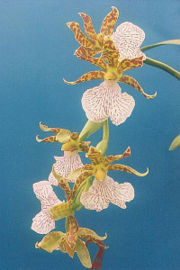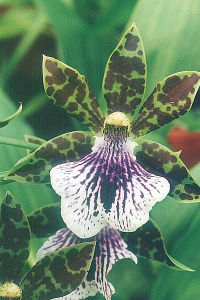Zygopetalum
Zygopetalum {{{latin_name}}}
|
'
| ||||||||||||||||||||||||||||||||||||||||
|---|---|---|---|---|---|---|---|---|---|---|---|---|---|---|---|---|---|---|---|---|---|---|---|---|---|---|---|---|---|---|---|---|---|---|---|---|---|---|---|---|---|

|
|
| |||||||||||||||||||||||||||||||||||||||
| |||||||||||||||||||||||||||||||||||||||||
Zygopetalum is a genus of the orchid family, consisting of about 40 species of medium-sized, evergreen, epiphytic or terrestrial orchids which are natives of humid forests at low- to mid-elevation parts South America, primarily Brazil.
The pseudobulbs are conical to ovoid and produce 2 or more narrowly elongated leaves, shaped like a lance, folded and leathery or fleshy.
Racemes are produced with highly fragrant, waxy, delicate and long-lived flowers, most of which have rich green-brown and indigo-blue colors and come in several patterns. They are erect, about 60 centimeter-long, few-flowered to several-flowered stems that grows laterally longer than the leaves.
They are known for their ease of culture and are much in demand as excellent cut flowers.
Cultivation
Cool to intermediate growing orchids. Grow in standard orchid potting mix (epiphytic) in containers that can accommodate their root systems, or in slatted baskets. Provide high humidity and bright light during growth, while watering freely and fertilizing with orchid fertilizer. During winter, give it full light and sparing water.
Propagation
Divide when roots fill container and flow over sides. Otherwise, remove backbulbs which you can then pot separately.
Pests and Diseases
Susceptible to spider mites, aphids and mealybugs.
Species

- Zygopetalum brachypetalum Lindl.
- Zygopetalum ghillanyi (Brazil).
- Zygopetalum graminifolium (Brazil).
- Zygopetalum hasslerianum (Paraguay).
- Zygopetalum maculatum Mackay's Zygopetalum (Peru to E. Brazil). type species (formerly *Zygopetalum mackai, Zygopetalum macaii (Hook.) - Epiphytic with fleshy ovoid pseudobulbs and 2 or 3 pendant leaves which are lance shaped, leathery, apical, and 12-20 in. (30-50cm) long. The racemes are upright, with 5-7 green flowers, up to 3in (8cm) across and with bars of brown coloring and a heavily veined indigo-blue lip. Flowers autumn-winter. 12in (30cm) tall, 18in (45cm) wide. Min temp 52-55F (11-13C), Max temp 86F (30C).
- Zygopetalum maxillare : Chin-bone Zygopetalum (Brazil to NE. Argentina)
- Zygopetalum microphytum (SE. Brazil).
- Zygopetalum pabstii (Brazil).
- Zygopetalum pedicellatum Mosen's Zygopetalum (SE. Brazil).
- Zygopetalum Perrenoudii (Z. intermedium x Z. maxillare). Epiphytic with fleshy ovoid pseudobulbs and 2 pendant leaves which are lance shaped, leathery, apical, and 12-20 in. (30-50cm) long. The racemes are upright, with 5-12 green flowers, 2-3in (5-7cm) across and with light bars of brown coloring and a heavily veined indigo-blue lip. Flowers autumn-spring. 12in (30cm) tall and wide. Min temp 52-55F (11-13C), Max temp 86F (30C).
- Zygopetalum reginae (Brazil)
- Zygopetalum rigbyanum (Brazil).
- Zygopetalum sellowii (SE. Brazil).
- Zygopetalum silvanum (Brazil - Bahia).
- Zygopetalum sincoranum (Brazil - Bahia).
- Zygopetalum triste Dark-purple Zygopetalum (Brazil - Minas Gerais) (terrestrial or lithophyte)
References
- American Horticultural Society: A-Z Encyclopedia of Garden Plants, by Christopher Brickell, Judith D. Zuk. 1996. ISBN 0789419432